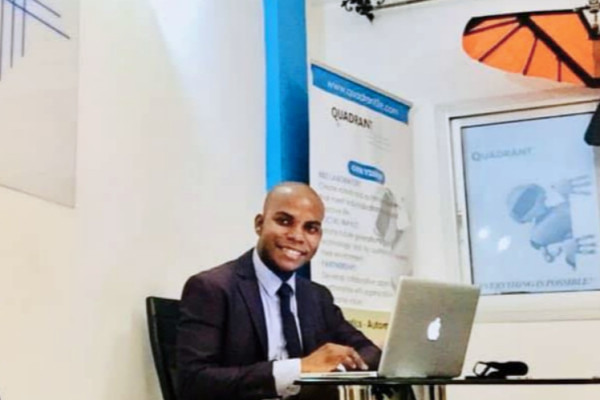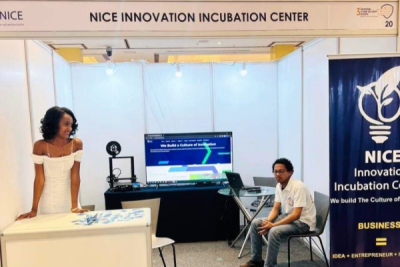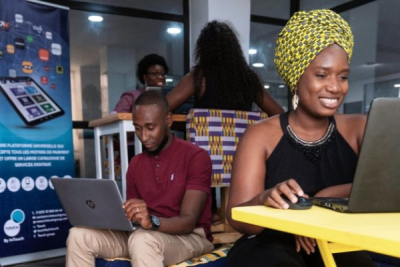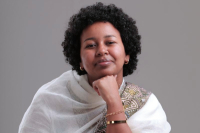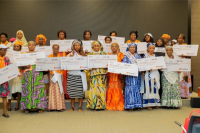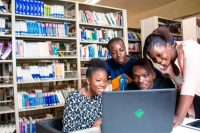Artificial intelligence and robotics sectors are steadily making inroads in Africa. In Cameroon, serial entrepreneur Jacques Eone leads the charge to popularise these emerging technologies.
Jacques Eone (photo), a Cameroonian serial entrepreneur, is the co-founder and CEO of Sparte Robotics. His company, established in 2021, aims to popularise robotics, science, and engineering by providing services that enhance and simplify daily life for its customers.
Sparte Robotics specializes in supplying robotic instruments, particularly drones, and security solutions to businesses and individuals. The company aims to automate services in various sectors, including security, mapping, and industrial production. It is also a research and development center for robotics and artificial intelligence.
To encourage African governments, donors, and local businesses to invest more in robotics and AI in Africa, Sparte Robotics launched the Elviatech competition in 2023. The competition brings together teams from several countries to exchange skills and build robotic instruments specific to a particular theme, Eone explained.
In addition to his role at Sparte Robotics, Eone is the president of the Cameroon Robotics Association, which he founded in 2018 to demystify robotics in Africa. The association organizes free training courses for college and school students.
Eone is also a founding partner of CENTHORUS Corporation, a Cameroonian software engineering company, and the founder of Alkacun, an e-commerce platform established in 2021. Alkacun offers various purchasing options, from simple distribution to auctions.
Melchior Koba
The inaugural Algerian Digital Summit is set to take place from April 23 to 25, 2024, at the Moufdi Zakaria Cultural Center in Algiers. The event, announced on March 20, is born from the consolidation of the Digital African Summit and ICT Maghreb.
Tunisian authorities announced on Monday, March 25, the official adoption of online birth certificates for administrative procedures related to the Ministry of the Interior’s services. This provision extends to Tunisians living abroad, who can now use these online birth certificates for applications or renewals of national identity cards and passports.
Focused on promoting knowledge-based businesses, Nice Innovation Incubation Center is committed to fostering a culture of innovation and equity, with the ambition of turning bright ideas into tangible successes.
Established in 2018, the Nice Innovation Incubation Center is an innovation hub aimed at addressing the technological development gap in Ethiopia. The center’s vision is to cultivate an incubation and innovation ecosystem that nurtures knowledge-based businesses.
Its mission is to foster an innovative culture within the university environment and to establish a work culture grounded in fairness, equality, and performance. The center is committed to training bright minds for excellence in science, technology, fine arts, and the creation of marketable interdisciplinary knowledge.
The center’s areas of interest span a wide range of fields, including artificial intelligence, quantum computing, virtual, augmented, and mixed reality, cybersecurity, robotics, the Internet of Things, Industry 4.0, blockchain, advanced materials, drones, biotechnology, and more. Headquartered in Addis Ababa, the center also operates in Nairobi, Kenya, and has plans for expansion into other East African countries.
It collaborates with and invites technical and marketing experts for training, coaching, and mentoring programs. It also builds partnerships with local industrial companies and offers infrastructure consultancy and investment support.
Through its incubation program, the Nice Innovation Incubation Center welcomes technical or business ideas from students and emerging entrepreneurs. It provides support throughout the process, from planning to prototyping, to help turn their ideas into reality and bring them to market.
For each project that is successfully incubated, the center facilitates the prototyping process. It liaises with banks and public bodies to secure startup loans for the continued support of products and startups.
Melchior Koba
On March 20, the Egyptian Space Agency (ESA) and the Chinese Space Administration (CASC) signed a protocol agreement in Cairo for the operation of the EgyptSat-2 satellite. The agreement includes provisions for CASC's support in the peaceful utilization of space and the promotion of sustainable development in Egypt.
IFC's equity investment indirectly supports the least financed African startups. This comes amid a 36% plunge in funding raised by African startups in 2023, to $3.2 billion.
International Finance Corporation (IFC) disclosed yesterday, a $10.5 million investment in the 4DX Ventures fund, which supports African tech companies. This investment was facilitated by a new platform launched by the IFC in November 2022, designed to bolster venture capital ecosystems in Africa, the Middle East, Central Asia, and Pakistan.
“By supporting the development of tech ecosystems in emerging markets, IFC's venture capital platform aims to improve access to key services, boost business competitiveness, and promote job creation through digital transformation,” stated Mohamed Gouled, IFC’s Vice President of Industries.
The investment in the 4DX Ventures fund aligns with IFC’s commitment to backing tech entrepreneurs whose innovations are poised to propel Africa forward in key sectors such as climate, healthcare, fintech, e-commerce, and education.
This move comes amid a 36% decrease in fundraising by African startups in 2023, dropping to $3.2 billion, according to research firm TechCabal Insights. IFC data indicates that Africa is among the regions least served by venture capital, receiving a mere 2% of the global venture capital deal volume in the third quarter of 2023.
This investment is expected to provide further support to African startups, aiding promising tech startups in building transformative businesses and making a lasting impact on the continent’s development.
Samira Njoya
Introduced to technology at the tender age of 7, she quickly made her mark in her country's tech companies just three years later. She now dedicates her time to educating children and young adults about technology, fostering innovation and entrepreneurship among the next generation.
Betelhem Dessie (photo), an Ethiopian computer scientist and entrepreneur, serves as the co-founder and CEO of iCog Anyone Can Code. This initiative, which aims to provide children and young people with tech skills, was established as a company in 2020, following its inception as an initiative in 2016. Its mission is to democratize access to technology and tech education. Through its various projects, it offers training in robotics, artificial intelligence, and programming, enabling young learners to innovate and create. With a team of 40 mentors and trainers, the company has already reached 26,000 children and young adults.
iCog Anyone Can Code organizes free public workshops in state schools and runs a six-month acceleration program, the AYSRH Project, to support youth-led or owned start-ups focusing on adolescent and youth sexual and reproductive health. In collaboration with its partners, the company is piloting other initiatives such as the Girls Can Code project and the Solve IT national innovation competition for young people.
iCog Anyone Can Code operates as a subsidiary of iCog Labs, an artificial intelligence and robotics laboratory where Dessie serves as a senior consultant. The lab offers a range of research and development services to international clients, including artificial intelligence and bioinformatics research, as well as machine learning-based data analysis and application software development.
Dessie’s interest in technology began at the age of 7. By 2008, when she was nearing her 10th birthday, she was employed as a software developer at the Information Network Security Agency. In 2012, she worked as a mobile application developer for TECNO Mobile ET, and from 2012 to 2015, she served as a technical manager for EBAGD Computer and Related Working PLC. She also held a position as a trainer at Bahir Dar University.
Dessie’s contributions have earned her several accolades. In 2012, she received the Best Project of the Year award from the Center of Excellence. She was named Outstanding Girl of the Year at the Ethiopian Girls Awards in 2017 and Young Technologist at the Tech Playmakers Award two years later. She was also included in Quartz’s 2019 list of African innovators to watch. In 2023, she was honored with the Professional Excellence Award at the Bikila Award in Ethiopia.
Melchior Koba
On March 21 in Porto-Novo, Louis Vlavonou, the President of Benin's National Assembly, met with Ouanilo Medegan Fagla, the Director General of the Centre national d'investigations numériques (CNIN). Fagla noted the dynamic nature of the National Assembly and the urgent need for digitization. In response to the clear intent of the President of the National Assembly, Fagla expressed CNIN's readiness to support the digital transformation underway at the national assembly, while upholding the principles of digital security integral to this transformation.
African development strategies prioritize lifting women out of financial insecurity. Various stakeholders across the continent are contributing initiatives to address the issue.
Fondation Orange Côte d’Ivoire (FOCI) and Orange Bank Africa (OBA) have advanced their commitment to empowering women entrepreneurs by establishing the Women’s Digital Home Fund for Women’s Empowerment (Fomdaf). Announced at a signing ceremony on March 21, 2024, the initiative aims to provide financial backing to vulnerable women entrepreneurs, enabling them to fully realize their business potential.
The guarantee fund, valued at XOF100 million ($165,700), is provided by Fondation Orange Côte d’Ivoire and managed by Orange Bank Africa. It is designed to enhance financial access for women beneficiaries of the Digital Homes project. With this guarantee, eligible women entrepreneurs can access loans totaling up to XOF500 million. Each woman can borrow between XOF1 and 20 million, with flexible repayment terms over a period of 6 to 24 months, at a competitive annual interest rate of 8.5%.
“Today, 32% of Orange Bank customers are women […] We are now moving on to another stage with this fund, which will support women as they grow,” stated Alexandre Oro, Secretary General of Orange Bank.
The signing ceremony also featured the presentation of the Coups de Coeur Ô Féminin Awards, an initiative launched in 2017 by the Fondation Orange Côte d’Ivoire to support women trained at the Maisons Digitales in their entrepreneurial endeavors. These awards, divided into three categories, offer prize pools of up to 10,000 euros (around XOF6,500,000) for the winners, bolstering their financial access and their ability to transform innovative ideas into reality.
To date, only 48 projects have been financed out of 6,871 women trained. This figure underscores the distance yet to be covered to fully achieve the goal of economic empowerment for women in Côte d’Ivoire.
Moutiou Adjibi Nourou
To stimulate entrepreneurship and innovation in Togo, the local campus offers training programs, startup assistance, and co-working spaces. The initiative encourages the application of technology to address challenges in various sectors, including education, agriculture, and health.
Djanta Tech Hub, a technology campus in West Africa, is striving to become a leading reference point for technological entrepreneurship and training in new digital professions. The initiative, launched by the Togolese government, aims to foster entrepreneurship, creativity, and economic growth through digital technology, innovation, and research.
Established in 2018, the campus spans 3,000 square meters and supports the growth of Togo’s key economic sectors by incorporating information and communication technologies (ICT). It concentrates its efforts on a range of sectors, including education, agriculture, green technologies, health, financial inclusion, and more.
The Djanta Tech Hub plans to achieve its goals through various components. These include the Djanta Academy, a digital training excellence center; the Djanta Start accelerator and incubator; and NanaTech, a space dedicated to female entrepreneurship. The campus also provides a connected café area, meeting and conference rooms, and a one-stop service for all startup procedures.
The campus features a prototyping and research laboratory known as Djanta Lab, which is designed to be a hub for a diverse group of experts, including engineers, designers, students, and innovators. The lab is equipped with testing tools and platforms (Android, iOS, Firefox, etc.), a 3D printer, and augmented reality glasses.
Djanta Tech Hub also offers a coworking space where entrepreneurs, project leaders, and students from across Togo can collaborate. This space fosters the co-creation and co-development of digital applications, bringing together the initiatives of young people and providing a conducive environment for discovery, innovation, and creativity.
Melchior Koba
More...
Digital technology plays a crucial role in Japan's economy, society and technology. Having made significant progress in this field, the country is keen to share its knowledge and successes with other nations, including Burkina Faso.
Japan is ready to support Burkina Faso in the implementation of its digital projects, Japanese ambassador to Burkina Faso, Jun Nagashima (photo, left), said during an audience with the Minister for Digital Transition, Posts and Electronic Communications, Aminata Zerbo/Sabane (photo, right), on Friday, March 22.
"On behalf of Japan, I want to reiterate our strong commitment to continuing cooperation with Burkina Faso, especially in the digital realm. In today's globalized world, digital technologies are essential drivers of development. Japan has extensive experience in this field, and we're eager to share that knowledge and collaborate with Burkina Faso," said Jun Nagashima.
Japan has been among the leading nations in technology, especially robotics, for several decades. Japanese companies have developed numerous prototypes to simplify people’s lives. The country also excels in artificial intelligence, the Internet of Things (IoT), and video games. In 2016, the Japanese government launched an initiative called Society 5.0, aimed at leveraging technology to address societal and economic challenges such as an ageing population and regional disparities in living standards.
In the realm of telecommunications, Japan is at the cutting edge of technological advancements in fibre optics development. The country holds the record for high-speed internet access, with Japanese scientists achieving a transmission of 22.9 petabits per second in a single optical fibre in December.
Collaboration in these areas would allow Burkina Faso to fully benefit from Japan’s advanced digital transformation expertise. Through experience sharing, Burkina Faso could leverage Japan’s proficiency, particularly in the development of digital administration, digitisation of public services and administrative procedures, and the application of artificial intelligence, among other areas.
Samira Njoya
In addition to collaborating with nations across different continents, African countries are joining forces to accelerate their digital transformation. This is the case of the cooperation between Zimbabwe and Mozambique in the judicial sector.
Mozambique plans to digitize its entire judicial system. Against this backdrop, the President of the Mozambican Supreme Court, Adelino Manuel Muchanga (photo, left), visited his Zimbabwean counterpart, Luke Malaba (photo, right), on Wednesday 20 March. The aim was to learn more about the Integrated Case Management System (IECMS) used by the Zimbabwean judicial services.
"We came to see what happened in Zimbabwe when it came to implement successfully the system and I think the key to the success, among other reasons, is that this is a national program," says Adelino Manuel Muchanga. He continued: "We are at the starting point and I think we will take this experience to Mozambique and see how we can involve the Government and other stakeholders so that we implement the system for many advantages that the systems can bring to the efficiency of the judicial system in Mozambique."
Like many African countries, Mozambique is in the process of digitally transforming key sectors of its economy. Countries such as Senegal, Côte d'Ivoire, and Kenya have already embarked on this path, investing several million dollars in the process. Earlier this month, the Chief Justice of the Supreme Court of Kenya, Martha Koome, set 1 July as the deadline for her country's courts to stop printing pleading documents. These decisions aim to improve the efficiency of the judicial system and facilitate access to legal services for the population, notably those living in remote or isolated areas.
Zimbabwe's judicial services have been using IECMS since 2018. According to Luke Malaba, it particularly helped Zimbabwe improve efficiency and transparency in the sector.
Adoni Conrad Quenum
Amid the ongoing digital transformation, the digital sector has emerged as a significant source of employment. It presents a plethora of job opportunities for the youth. By equipping themselves with the necessary skills, they can capitalize on these opportunities for an easier transition into the workforce.
On Friday, March 22, tech company Huawei announced plans to train over 5,000 young individuals in Burkina Faso in ICT skills within the next five years. The announcement was made by Christophe Liu, the Managing Director of Huawei Burkina, following a meeting with the President of the Transition and Head of State, Ibrahim Traoré, and the Minister of Digital Transition, Posts and Electronic Communications, Aminata Zerbo/Sabane.
“We have come to update the Head of State on the various projects we are implementing. We aim to train the Burkinabe youth in ICTs, including 5G, cloud, and AI. We are initiating a project with the government and the Ministry of Digital Transition, Posts, and Electronic Communications,” stated Liu.
In addition to training, Huawei announced other initiatives, including the installation of a fiber optic cable extending over 2,000 km to provide internet connectivity in the country’s most remote regions. This fiber optic cable will also connect various administrative sectors to enhance communication efficiency.
These initiatives align with Huawei’s commitment to assist the Burkina Faso government in achieving the goals of the national digital economy development strategy, “e-Burkina”. This strategy aims to educate citizens about new technologies, create inclusive and sustainable employment opportunities for the youth, and foster the growth of the digital economy in Burkina Faso.
Samira Njoya
She is committed to making banking services accessible to all while reducing dependence on cash. She heads a startup that harnesses the power of artificial intelligence to understand users' needs and offer them appropriate services.
Matina Gaël Egbidi (photo), a Togolese software engineer and entrepreneur, is the co-founder and CEO of SOLIMI, a fintech startup established in 2020.
Through SOLIMI, she aims to democratize access to banking services and reduce the use of cash. It uses artificial intelligence to analyze customer behavior, predict purchases, and adapt its services to local habits. It designs Visa prepaid cards that are free of charge and can be funded via mobile money. Its cards and its mobile application enable users to make purchases in shops and online.
"We believe that Solimi can have a huge impact on unbanked and low-income communities. By making financial inclusion much more affordable, as well as simpler and more versatile, we can walk together towards a cashless world that works for everyone, at every level of wealth," says Matina Gaël Egbidi.
Operating like an ordinary bank card, Solimi's solution can also be used to withdraw cash from an ATM. On Monday 18 March 2024, the startup was awarded the "Togolese start-up prize" at the Startup Day organized by the Nunya Lab incubator to celebrate the International Start-up Day.
Prior to SOLIMI, Matina Gaël Egbidi co-founded Bassite Innovation and Technology in 2017. Based in Morocco, it is a company that uses the power of the cloud and artificial intelligence to develop conversational interfaces to bring brands closer to their customers. The entrepreneur was the company's COO until 2021.
Matina Gaël Egbidi is a graduate of the Moroccan School of Engineering Sciences. Her professional career began in 2017 at OCTO Technology, where she was an intern. OCTO Technology is a consultancy firm specializing in new technologies and the challenges of digital transformation. Between 2018 and 2021, the Togolese was an e-payment training consultant at HPS, a Moroccan provider of payment solutions and services.
Melchior Koba


